

BOSCH - Figma Plugin Development

project overview.
This project originated from the need for a streamlined process that allows designers to convert their high-fidelity designs into functional web pages without extensive coding knowledge.
The goal was to create a Figma plugin that automates this conversion, making it easier for designers to implement their work directly into HMI systems.
The plugin was designed to facilitate the following:
Integration with Existing Workflows
A solution that seamlessly connects the design process with development, allowing for a smooth transition from design to deployment.
Enhanced Collaboration
The plugin aims to foster better collaboration between HMI designers and engineers, ultimately improving the overall quality and consistency of the final product.
role.
Full-stack developer
timeline.
4 months
tools.
Figma, MERN Stack
problem statement.
Designers often struggle with translating high-fidelity car infotainment designs from Figma into functional web pages. Existing solutions do not offer an efficient or accurate way to export designs, leading to inconsistencies, limited accessibility, and a lack of integration with development workflows.
goals and objectives.
01
Enhance Usability
Create a seamless user experience within Figma for design exports.
02
Ensure Accuracy
Maintain design fidelity during the conversion process.
03
Implement Version Control
Enable users to track changes and updates to their designs.
04
Support Multiple Exports
Allow the export of multiple frames and components efficiently.
proposed user flow.

wireframing and prototyping.
login panel.

export frames panel.

version control and export.

Hand-sketched wireframes and medium-fidelity designs depict the main workflow of the plugin as figma modal component:
Login Interface: Secure user authentication and new user sign-up.
Frame Selection: Users can select frame for export and view relevant details, for initial development phase.
Version Management: Display current design versions and support font uploads for accurate text representation.
login panel.

export frames panel.

version control and export.

usability testing and
feedback.
During testing, users provided valuable feedback that highlighted two main areas for improvement:
-
Multiple Frame Export Capability: Users requested the ability to export several frames simultaneously.
-
Component Update Mechanism: Users needed a way to modify components shared across multiple frames without re-uploading each instance.
refined solutions.
In response to user feedback, the following enhancements were proposed:
Multiple Frame Export: Users can select and export multiple frames at once, streamlining the workflow.

Component Library Integration: Added a component library in the web application, allowing users to upload and manage design components independently. Changes to components would automatically update all associated designs, promoting consistency and efficiency.

Component Library Wireframe
Low-fidelity designs were created to illustrate the component library's functionality within the web application.
High- fidelity designs not shared here due to NDA
outcomes.
The Figma Plugin successfully addressed the identified problems, leading to:
-
Improved Workflow Efficiency: Users can now export designs with ease, reducing development time.
-
Increased Design Fidelity: Maintained accuracy in design translations, ensuring a seamless transition from design to implementation.
-
Effective Version Control: Users can easily manage design iterations, promoting collaboration and clarity.
-
Enhanced Component Management: The component library feature simplifies updates and ensures consistency across designs.








